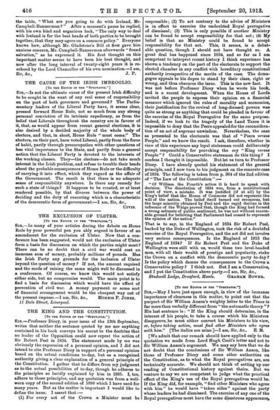THE KING AND THE CONSTITUTION.
[To THE EDITOR OP THE "SPECTATOR."] SIR,—Professor Dicey, in your issue of the 13th September, writes that neither the sentence quoted by me nor anything contained in his book conveys his assent to the doctrine that no leader of the Opposition could now repeat the action of Sir Robert Peel in 1834. The statement made by me was obviously the expression of a personal opinion, and I did not intend to cite Professor Dicey in support of a personal opinion based on the actual conditions to-day, but as a recognized authority giving a clear explanation of a general principle of the Constitution. I gather that he differs from my judgment as to the actual possibilities of to-day, though he adheres to the principles so lucidly explained by him in 1885. I, too, adhere to those principles, and my quotation was from a well- worn copy of the second edition of 1886 which I have used for many years. But as the matter is important I would like to define the issue. I assert that :- (1) For every act of the Crown a Minister must be
responsible ; (2) To act contrary to the advice of Ministers is in effect to exercise the undoubted Royal prerogative of dismissal ; (3) This is only possible if another Ministry can be found to accept responsibility for that act; (4) My belief is that no Ministry could be found to accept
responsibility for that act. This, it seems, is a debat- able question, though I should not have thought so. A
great deal has happened since 1834, and so far as I am competent to interpret recent history I think experience has shown a tendency on the part of the electorate to support the elected chamber in any conflict with hereditary constitutional authority irrespective of the merits of the case. The dema- gogue appeals to his dupes to stand by their class, right or wrong, and thus obscures the issue. This is the new fact. It was not before Professor Dicey when he wrote his book, and is a recent development. When the House of Lords invited the people to express their opinion on a financial measure which ignored the rules of morality and economics, their justification for the revival of long-disused powers was quite as strong as anything that could be pleaded in favour of the exercise of the Royal Prerogative for the same purpose. Indeed, if we look to the tragedy of the Land Taxes it is impossible to deny that the Peers appealed for the reconsidera- tion of an act of supreme unwisdom. Nevertheless, the case as presented to the electorate was that of " Peers versus People," and we know the result. I ask, therefore, whether in view of this experience any loyal statesman could deliberately accept responsibility for provoking the cry "King versus People " ? Could a Conservative statesman do this thing ? I confess I thought it impossible. But let us turn to Professor
Dicey. I have already quoted his statement of the general principle, and I now turn to his judgment on the concrete case
of 1834. The following is taken from p. 364 of the 2nd edition of " The Law of the Constitution ":—
" Of William the Fourth's action it is hard to speak with decision. The dissolution of 1834 was, from a constitutional point of view, a mistake. It was justified (if at all) by the King's belief that the House of Commons did not represent the will of the nation. The belief itself turned out erroneous, but the large minority obtained by Peel and the rapid decline in the influence of the Whigs proved that, though the King had formed a wrong estimate of public sentiment, he was not without reason- able ground for believing that Parliament had ceased to represent the opinion of the nation."
That is to say, in the England of 1834 Sir Robert Peel, backed by the Duke of Wellington, took the risk of a doubtful
exercise of the Royal Prerogative, and the act did not involve very serious consequences. Is the England of 1913 the England of 1834? If Sir Robert Peel and the Duke of Wellington were still with us, would these two level-headed men, with all their wealth of prestige and popularity, stake the Crown on a conflict with the democratic party to-day ? Is the policy which damns the consequences to the Crown a Conservative policy ? I think not. But I am a Conservative, and I put the Constitution above party.—I am, Sir, &e., Studwell Lodge, Droxford, Hants. GRAHAM BOWER,










































 Previous page
Previous page